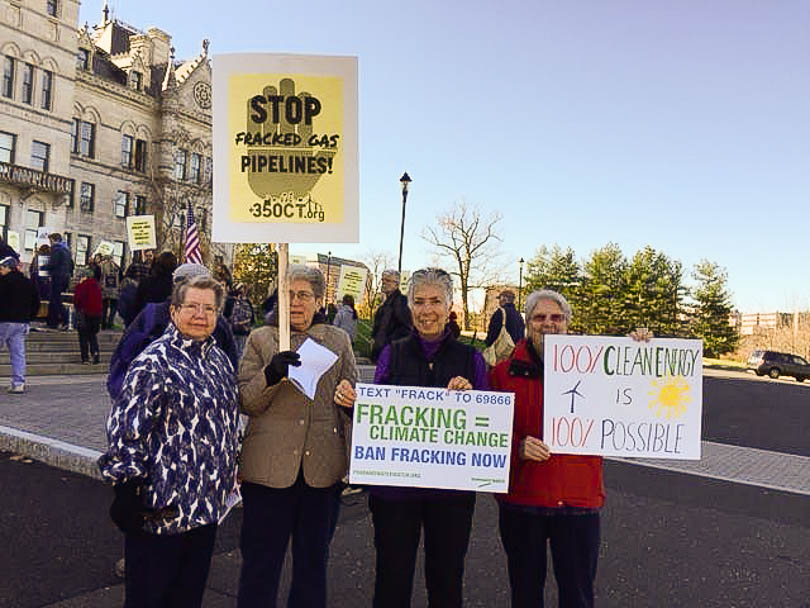By Sister Cecilia Baranowski
Lent reminds us anew that we are called to be timeless people—people with a purpose, moved by God’s love to be healers. About a year and a half ago, I was called to be a timeless person—and a healer in a new way—when I began advocating against fracking waste in Connecticut.
Being an Earth healer was a new concept for me, a Sister of Mercy who for years has ministered in hospital and hospice settings, providing energy healing, healing touch and therapeutic touch to cancer patients and others who request it.
But when I became involved a couple of years ago with social justice ministry at Hartford’s Collaborative Center for Justice, an organization of Catholic religious sisters working for systemic change, I saw that all healing is One. Through the center, I met a local Food and Water Watch coordinator and learned about the organization’s efforts to prevent fracking waste from coming into Connecticut.
Fracking is a drilling process that injects liquid at high pressure into subterranean shale to extract gas and oil. Although there is no fracking in Connecticut—there are no shale deposits to fracture—radioactive waste produced by fracking is transported through the state from Pennsylvania, on its way to Massachusetts. This contaminated sludge, which threatens all forms of human and animal life, as well as water, soil and atmosphere, can be used for road de-icing, road fill and construction-site fill.
Food and Water Watch initially worked town by town to convince Connecticut’s town councils to ban fracking waste use. I joined the effort from Wolcott, an upper-middle-class town where I live. Twice I spoke before the Wolcott Town Council and gave members information on fracking waste, but they were not moved. Not many townsfolk were interested, either. Fracking waste was not a real threat yet, so few people were thinking ahead.
Several Sisters of Mercy and I had more success last summer when we were part of an effort that moved Hartford’s Common Council to ban fracking waste. In my presentation to council members, I shared with them why caring for Earth is one of the critical concerns of the Sisters of Mercy.

Although I was disappointed with the Wolcott outcome, I am not easily discouraged. I set my sights on state government. A bill that would ban fracking waste in Connecticut was taken up by the state legislature’s Environmental Committee and a public hearing was called. I did what any Sister of Mercy who cares about Earth would do. I alerted our sisters, Mercy Associates and Companion in Mercy in the greater Hartford area, emailed my statement of support for the proposed bill, and then testified before the committee in support of the proposed bill. Two Environmental Committee members approached me after the hearing and affirmed their support. I am hopeful that a fracking waste ban will soon become a Connecticut law.
I know that not everyone is inclined to muster public support for an issue, speak before town councils, go to their state capital and speak at a public hearing. There are other climate-justice actions you can take, however, such as:
- Visit the website 350.org, to educate yourself on these issues and sign prepared letters to elected officials. (The number 350 refers to the parts per million of C02 in the atmosphere that make for a livable planet. Current C02 levels are over 400 ppm.)
- Be aware of packaging when shopping, as these materials often get disposed of in landfills. (Amazon is a large offender with its over-packaging.)
- Avoid plastic straws.
For me, Lent is a time to meditate on such Scripture passages as, “Be still and know that I am God” (Psalm 46:10) and “Love as I have loved you” (John 13:34). When we are in touch with the Spirit who sustains us, we know that healing Earth and healing ourselves are connected—that Oneness is our calling.
To deepen your engagement with the Sisters of Mercy’s Critical Concern of Earthduring the season of Lent, please explore an examination of conscience for consumers, a faith leader’s guide to the impacts of climate change on regions throughout the United States, and a study & action guide to Laudato Si.